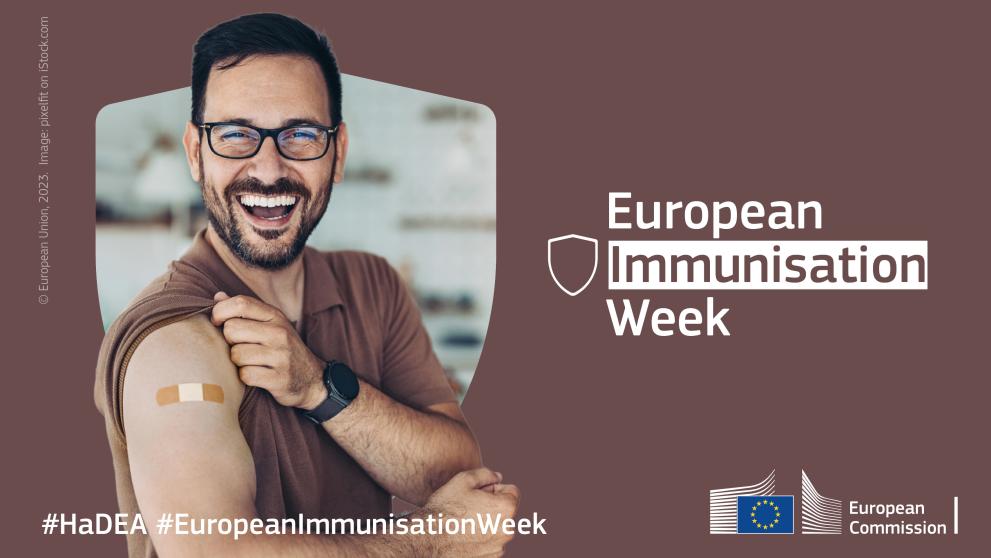
The European Immunisation Week 2023 runs from 23 to 29 April. The aim of the week is to raise awareness of the importance of immunisation in preventing diseases and protecting everyone’s health. Throughout history, vaccines have played a key role in protecting the lives of people of all ages.
HaDEA has been funding projects under the Horizon 2020 programme, EU4Health and the Third health programme that are supporting this mission, working on improving vaccination rates.
RIVER-EU
The Horizon 2020 project RIVER-EU aims at increasing the uptake of vaccines against measles, mumps, and rubella (MMR) and the Human papillomavirus (HPV) in underserved communities. The project has gathered evidence on high and low vaccine uptake in 2 and 5 countries, respectively, and is now developing interventions to reduce barriers to vaccine uptake and increase trust in health systems.
Funded under EU4Health:
Overcoming Obstacles to Vaccination
The project aims to overcome physical, practical, and administrative obstacles to vaccination and increase vaccination rates. It will carry out a mapping of vaccination services in EU countries, conduct a large-scale survey, identify and analyse best practices and develop final recommendations.
Study on guidance on methodologies to assess the performance of vaccination programmes
The study will develop guidance on the methodologies used to monitor the performance of vaccination programmes in EU countries to maximise their impact.
VH-COMSAVAC
With the final aim to reduce mortality associated with liver cancer in Europe, the project is increasing testing for viral hepatitis and vaccination for the Hepatitis B Virus (HBV) and Hepatitis C Virus (HCV) among migrants and refugees living in Greece, Italy, and Spain. It has been testing the high incidence and prevalence of HBV and HCV in patients using simplified diagnostic tools and patient-centred referral processes.
Funded under the Third Health Programme:
ImmuHubs
ImmuHubs aims to reduce transmission of vaccine-preventable diseases through an increased vaccination uptake among disadvantaged, isolated, and difficult-to-reach population groups. It is establishing partnerships with citizen groups, public health agencies, key stakeholders and the general public in 8 EU countries. It has also further developed and customised 4 mobile apps for patients, families and health professionals.
IMMUNION
The project’s aim is to increase vaccine uptake. IMMUNION has been providing training to healthcare professionals and has been delivering accurate information to the public. The project has produced various training materials and lists of resources on vaccine communication and confidence. It also supported and strengthened the collaboration between the members of the Coalition for Vaccination, which works on fighting myths around vaccines and sharing best practices on vaccination.
AcToVax4NAM
AcToVax4NAM aims at increasing the vaccination uptake in Newly Arrived Migrants (NAM) by improving their vaccination literacy and access. The project has produced a report on existing immunisation guidelines, reception system and vaccination offered to NAM in partner countries. Based on this, it has identified system barriers and provided possible solutions, organised in a document that will be the blueprint for country-specific actions on how to improve the vaccination coverage for NAM.
RISE-Vac
RISE-Vac aims at increasing access and vaccine uptake among the prison population in Europe. The project will develop information and training materials tailored to detention centres workforce and detainees to increase their vaccine literacy. It will also develop and test models of vaccination delivery to correspond to the needs of the prison population, prison settings and national health priorities.
Collaboration with the EU health research programmes
In December 2022, IMMUNION, AcToVax4NAM and RISE-Vac joined forces with Horizon 2020 project JITSUVAX and VAX-TRUST and published an article in Nature Communications on the challenges regarding routine vaccine uptake in the context of the COVID-19 pandemic. The article provides recommendations on how to increase uptake, pointing to evidence-based resources that can support healthcare workers, policymakers and communicators.
BACKGROUND
Since 2003, the First, Second and Third health programmes have implemented EU health policy. Their successor, EU4Health, is the fourth and largest of the EU health programmes. The programme provides funding to national authorities, health organisations and other bodies through grants and public procurement, contributing to a healthier Europe.
HaDEA manages the vast majority of the total EU4Health budget and implements the programme by managing calls for proposals and tenders from 2021 to 2027.
Horizon Europe is the research and innovation programme of the EU for the period 2021-2027. The aims of Cluster 1 ‘Health’ include improving and protecting the health and wellbeing of citizens of all ages by generating new knowledge, developing innovative solutions and integrating a gender perspective to prevent, diagnose, monitor, treat and cure diseases.
Horizon 2020 (H2020) was the EU’s multiannual funding programme between 2014 and 2020.
RELEVANT LINKS
More on this series - European Immunisation Week: projects developing new vaccines and tackling misinformation
European Immunisation Week 2023
Overcoming Obstacles to Vaccination
IMMUNION - Coalition for Vaccination
Details
- Publication date
- 24 April 2023
- Author
- European Health and Digital Executive Agency
- Programme Sector
- Health
- Programme
- EU4Health
- Horizon Europe
- Horizon Europe Cluster 1: Health
- Tags
- AWP
- COVID-19
- Crisis preparedness
- Digital technology
- EU financing
- EUFunded
- Health preparedness
- HealthUnion
- Medical research
- Pharmaceutical industry
- Public health
